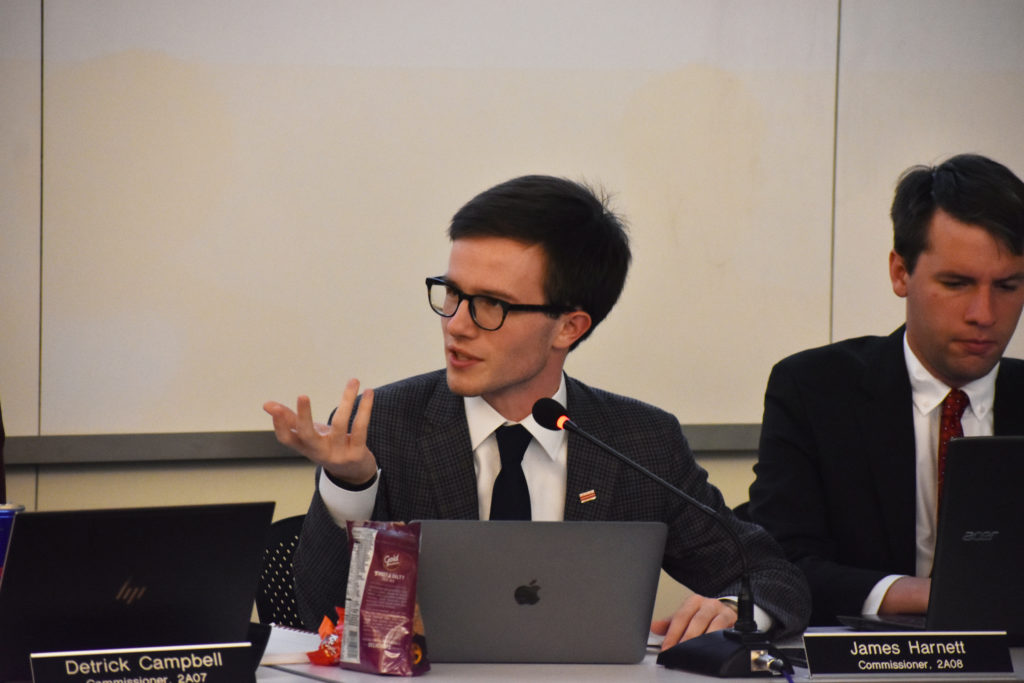A local governing body passed a record number of 72 resolutions this year – the most since at least 2014 – to address Foggy Bottom and West End citizens’ transportation, housing and traffic concerns.
The Foggy Bottom and West End Advisory Neighborhood Commission drafted and approved resolutions to support transportation and infrastructure projects, like increasing the number of on-campus Capital Bikeshare bikes and pushing for a traffic study on pedestrian safety in Washington Circle, at monthly meetings this year. Commissioner Detrick Campbell said the ANC heard out an increased number of resident concerns, which commissioners handled with projects and legislation.
“If it’s in your single-member district, we let you handle it because you know your neighbors well and those are the people who voted you in,” Campbell said.
The ANC spent about $3,000 more than its fiscal year budget of about $19,000 to pay for professional services, like a traffic engineer to study H Street and legal counsel for negotiations about Thurston Hall’s upcoming renovations.
Here’s an overview of some legislation passed in 2019:
Student housing during Thurston renovations
Commissioners approved an agreement in September to permit the University to house upperclassmen students in off-campus properties as Thurston undergoes construction in the next two years. About 550 undergraduates will live in One Washington Circle Hotel and the Aston beginning next academic year during renovations.
Commissioner Jeri Epstein said the ANC negotiated with the University for at least six months, navigating extensive discourse with community members over which buildings displaced students would live in and what terms of agreement the students would need to sign onto. Foggy Bottom residents expressed concern that housing students off-campus would create noise disturbances.
“We talked about what would be fair for the neighborhood and what would be fair for the students, and getting everybody to a point where they were not going to be shocked by each other’s presence,” Epstein said.
Commissioners spent the summer meeting with community members to garner feedback about the proposed housing situation, which places students in residential areas north of Washington Circle. The D.C. Zoning Commission unanimously approved the project at a hearing Monday.
Epstein said one of the most difficult parts of negotiating the Thurston project was convincing her constituents to warm up to the idea of living closer to students.
“It was an interesting challenge,” Epstein said. “It was a matter of getting people to come out of their corners and get together and work in the middle.”
Pushing for infrastructure projects
The commission funded a study last year for which planning firm Kimley-Horn experts observed the traffic patterns around Washington Circle to drum up ideas about how to increase pedestrian safety.
After the study was completed last December, the commission recommended that the District Department of Transportation construct a triangular traffic island where the circle intersects with 23rd Street. The traffic island officially opened in April.
Epstein said the commission worked on infrastructure projects, like the traffic island, in response to D.C.’s uptick in population.
“The city has doubled in size in 20 years, so now we have a lot more people using the same resources,” Epstein said. “So it makes it very difficult to keep up sometimes.”
The ANC also passed a resolution in June granting an after-hours work permit for Universal Health Services, the majority owner of the GW Hospital, to construct a helipad atop the hospital. The helipad opened with a ribbon-cutting ceremony in November following years of community debate from local leaders.
Transportation initiatives
Commissioners passed a resolution in April pushing District officials to reopen the 1900 block of H Street behind the International Monetary Fund. The IMF initially planned to close the street for only three years to make room for the project’s construction equipment but extended the closure for an additional three years in 2016 to ensure safety concerns, like asbestos, were addressed.
The ANC resolution requested that DDOT stop renewing IMF’s permit to close the street and for the road to be in full use by December. The IMF reopened the block in October.
Commissioners unanimously passed a resolution calling for DDOT to increase the number of Capital Bikeshare bikes on campus and to add a bike-share station on 21st and I streets last March.
After months of negotiations, the ANC urged DDOT in January to move forward with plans for a protected bike lane running through campus on 20th and 21st streets.
Senior and ANC commissioner James Harnett said the bike resolutions are some of the most impactful pieces the ANC has worked on.
“Making biking in your neighborhood safer and making it a more desirable option for students that want to get around the neighborhood get to their internships get to class, or just go on a ride around town, that’s something that I’m really excited about,” Harnett said.





